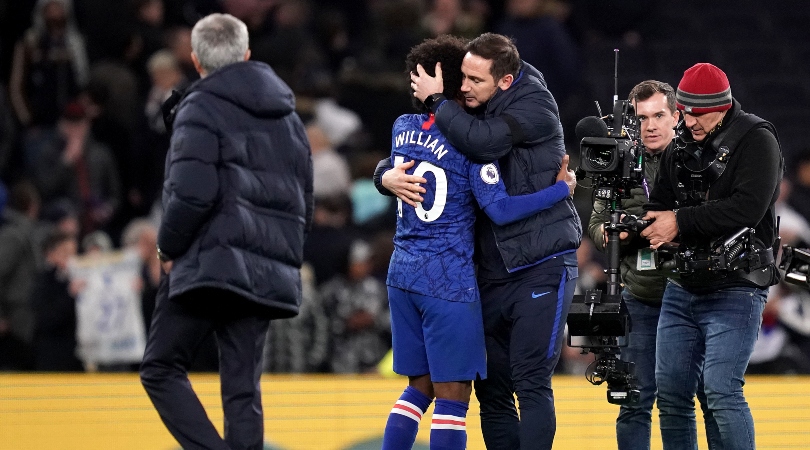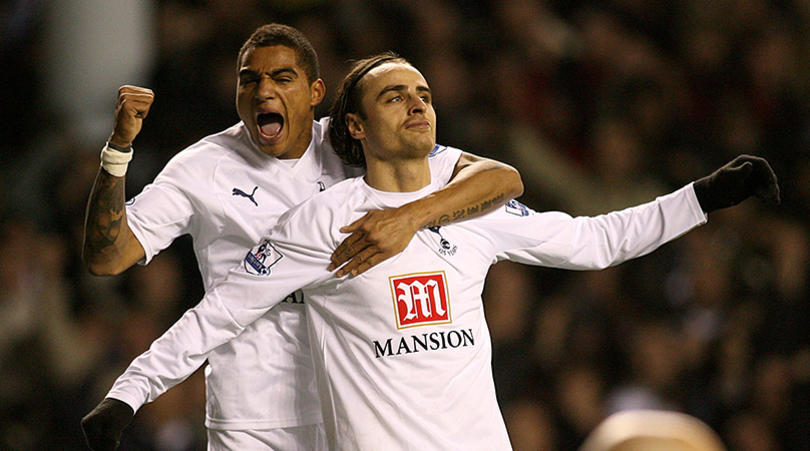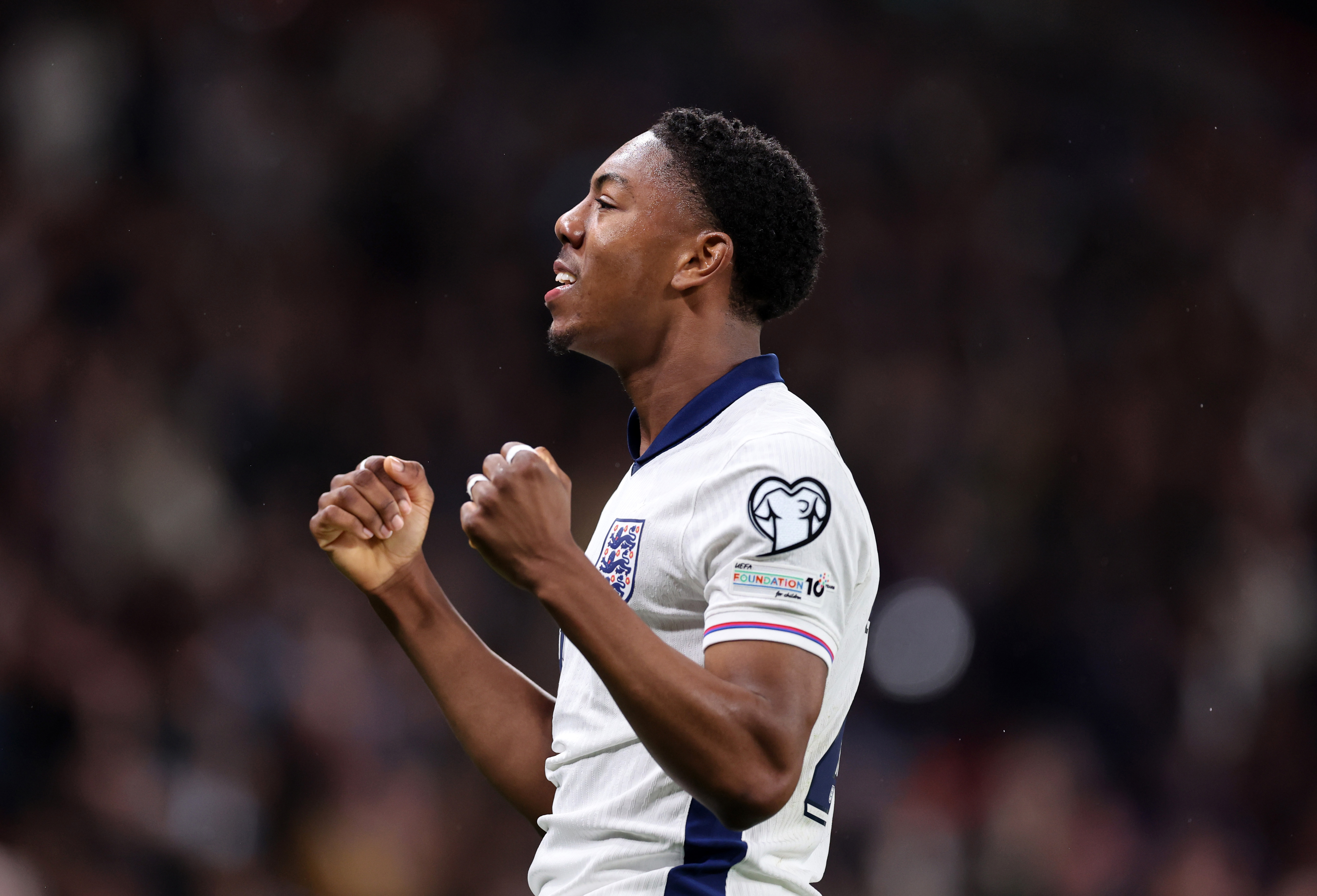Chelsea's win over Tottenham was more than just a tactical victory for Frank Lampard over Mourinho
The Blues boss was able to work out the strategy that would be successful – but it was implementing it that was really impressive

Frank Lampard needed to shake things up. Chelsea’s form has been such that a response was necessary and, on Sunday against Tottenham, Lampard gave one. Out went Emerson, replaced by Marcos Alonso. In came Fikayo Tomori, adding a further centre-back to the defensive line at the expense of Jorginho.
The defeat to Bournemouth had been bad enough to warrant it, but it was still a surprise. While Jorginho’s rhythmic passing may be his most obvious virtue, probably his greatest strength is his organisation. It may not be what he’s in the team to do, but it’s certainly something with which he's associated. He's a conductor, pointing other players into position and towards where he wants possession to flow. To remove him, therefore, carried a risk beyond his abilities.
But it worked really well. Not such good news for Jorginho, of course, but definitely another feather in Lampard's managerial cap. After all, while it’s fine to select a back-three - or make any major, mid-season adjustment, it’s another thing entirely to be successful.
In the week prior to the Tottenham game, Jose Mourinho had celebrated their non-involvement in the League Cup, presenting it as a chance for uninterrupted work on the training ground. Essentially, a week to hammer a few nails and tighten some bolts. Ultimately, doing what Mourinho is known for.
As it transpired, though, it was Lampard who looked like the technician. Sunday's game would ultimately be changed for good by Son Heung-min’s red card and, tonally, by the alleged instance of racial abuse suffered by Antonio Rudiger, but Chelsea had it won long before the South Korean was dismissed and deserve their praise even though, quite rightly, football was secondary by the time the match finished.
They were excellent. Their biggest issue against Bournemouth had been a game-long vulnerability down the flanks. Ryan Fraser and Josh King had terrorised Rudiger and Zouma and while the visitors needed a set-piece to score, they threatened several times from open play and continuously on the counter-attack.
The other observation, which seemed less problematic at the time, was that Chelsea’s exits from their own zone were awful. Even against a side who were largely content to sit deep, their progress up the field was generally clumsy and often relied on long, diagonal passes which, more often than not, picked out supporters in the crowd.
Get FourFourTwo Newsletter
The best features, fun and footballing quizzes, straight to your inbox every week.
So what an improvement this was. Just having an extra player at the back always helps in that regard, but that specific Chelsea group – the three centre-halves and whichever midfielder rotated into the deepest position – performed as if they’d been playing together for seasons. Tottenham’s press had no effect whatsoever. In fact, at times, Harry Kane, Son, and Lucas Moura might as well have been mannequins for the amount of pressure they exerted.
Chelsea were slick. They probably should have had more goals, such was their superiority, but the level of control they enjoyed was, at times, absolutely staggering. It couldn't have been more different to Bournemouth. Then, they were loose and fragile. Here, eight days later, they had the contest by the throat. The negative perspective would be to frame that as a consequence of everything that Spurs did wrong. That’s part of the conversation, it was a long list, but it shouldn’t lessen the perception of just how well their opponents circulated the ball and the progress which has been made.
Again, without Jorginho, who – whatever fans may think of him – has been an asset by virtue of his continual presence. His teammates are used to playing with him; they understand his positional trends and so, in a game of this magnitude, dropping him was a mighty call which, had it not been vindicated, would have left its author open to some easy criticism.
After the game, Mourinho rather mischievously suggested that Lampard had used Antonio Conte’s tactical system, presenting the 3-4-3 as a comfort blanket formation with which the players were familiar. Lampard didn’t like it. Nor should anyone else, really, because, as he correctly countered, Mount never played for Conte, nor did Tomori, Matteo Kovacic or Tammy Abraham.
“Can this be a system that helps us offensive and defensively to play against Tottenham?”
It was. But this wasn’t just a victory for Lampard in the tactical sense, because it also demonstrated how well he can teach. He’s a highly intelligent person, probably more so than most appreciate, but being able to think deeply about football isn’t the same as being able to communicate those ideas to a squad. Being a great theorist only has so much value.
This column has dealt with the theme of what Lampard can and cannot do before. Step by step, game by game. But it’s interesting. He has far more control over games than he was expected to have by this point and this, against a rival manager whose selling point is exactly that sort of pragmatism, was probably the high point of his coaching career so far.
While you're here, why not take advantage of our brilliant subscribers' offer? Get the game's greatest stories and best journalism direct to your door for only £9.50 every quarter – just £2.90 an issue. Cheers!
NOW READ...
INSIDE How Red Bull Salzburg are trying to do things differently in their quest for European supremacy
QUIZ Can you name the last 50 scorers in Chelsea vs Tottenham matches?
GUIDE Premier League live stream best VPN: how to watch every game from anywhere in the world
Seb Stafford-Bloor is a football writer at Tifo Football and member of the Football Writers' Association. He was formerly a regularly columnist for the FourFourTwo website, covering all aspects of the game, including tactical analysis, reaction pieces, longer-term trends and critiquing the increasingly shady business of football's financial side and authorities' decision-making.

